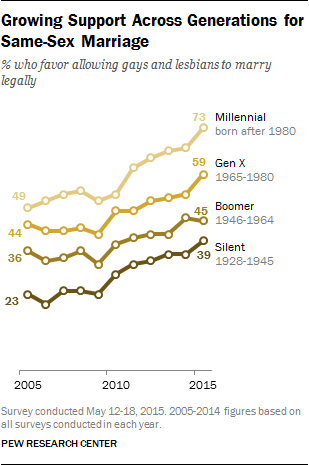
Support for same-sex marriage has increased substantially across virtually all demographic and partisan groups over the past decade. At the same time, there continue to be sharp differences in opinions about this issue – by generation, partisanship and ideology, race and religion.
Millennials – adults born since 1980 who are currently ages 18 to 34 – continue to be far more supportive of same-sex marriage than older age cohorts. Today, 73% of Millennials say gays and lesbians should be allowed to marry legally, while just 24% say they should not. Gen Xers, the next youngest cohort, also support gay marriage, though by a narrower margin (59% favor, 39% oppose).
Among older cohorts, Boomers (ages 51 to 69) are currently divided (45% favor, 48% oppose), while Silents (ages 70-87) are the only generation in which significantly more oppose (53%) than favor (39%) gay marriage. But among both Boomers and Silents, support for same-sex marriage has increased over the past decade (nine percentage points among Boomers, 16 percentage points among Silents).
Within each age cohort, there are wide partisan differences in support for same-sex marriage. The gaps are particularly striking among older age cohorts, Silents and Boomers.
Among Democrats and Democratic leaners in the Silent Generation, the balance of opinion about same-sex marriage has flipped over the past decade. In 2005, 53% of Silent Democrats opposed gay marriage, while just 31% favored it. Today, 54% support gay marriage and 34% are opposed.
Support for gay marriage among Silent Republicans and Republican leaners also has increased over the past decade (by 14 points). However, Silent Republicans oppose allowing gays and lesbians to marry legally by three-to-one (72% to 24%).
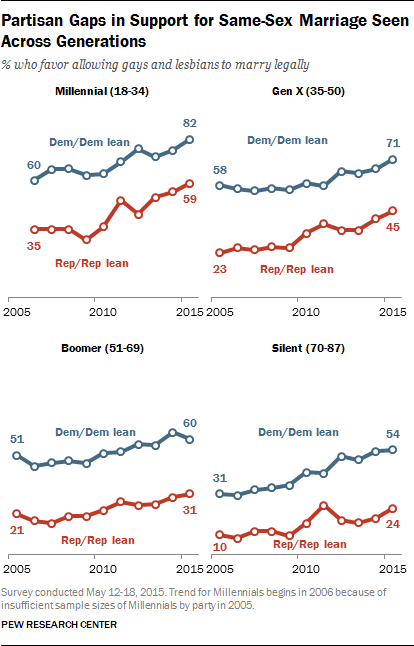
The share of Boomer Democrats who favor same-sex marriage has increased nine percentage points since 2005. There has been a similar, 10-point rise among Boomer Republicans. However, while Boomer Democrats currently favor gay marriage by 60% to 34%, Boomer Republicans oppose it by a comparable margin (62% to 31%).
Support for same-sex marriage among Republican Gen Xers and Millennials has increased dramatically over the past decade. Currently, 45% of Gen X Republicans and Republican leaners favor allowing gays and lesbians to marry legally, roughly double the percentage as in 2005 (23%). Still, Gen X Democrats are 26 points more likely than Republicans of that generation to favor gay marriage (71%).
Last year, the Pew Research Center found that a majority of Republican Millennials supported same-sex marriage. That remains the case today: 59% support gay marriage, up from just 35% a decade ago. Among Democratic Millennials, 82% favor same-sex marriage, up 22 points over the past decade.
Both Parties Ideologically Divided
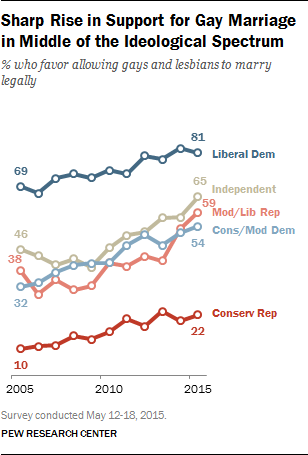
Ten years ago, liberal Democrats were the only ideological group in which a majority supported same-sex marriage. Today, majorities of every ideological group except one – conservative Republicans – favor allowing gays and lesbians to marry legally.
To be sure, the share of conservative Republicans supporting same-sex marriage has doubled, from 10% to 22%, since 2005. However, three-quarters of conservative Republicans (75%) continue to oppose gay marriage. About six-in-ten moderate and liberal Republicans favor same-sex marriage (59%), up from 38% a decade ago.
Like Republicans, Democrats are ideologically divided over same-sex marriage: 81% of liberal Democrats and 54% of conservative and moderate Democrats support same-sex marriage. This gap has narrowed somewhat from a decade ago, when 69% of liberal Democrats backed gay marriage, compared with only about a third (32%) of the party’s conservatives and moderates.
In 2005, political independents were divided on same-sex marriage: 46% favored it, while 43% were opposed. Today, about twice as many independents support (65%) as oppose (31%) gay marriage.
Racial Differences Over Same-Sex Marriage
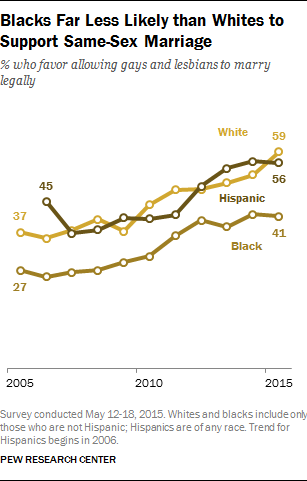
The share of blacks who support gay marriage has not changed significantly since 2012: 41% favor same-sex marriage today, while 51% oppose it; in 2012, 40% favored while 48% opposed. By contrast, over the past three years, support for gay marriage among whites has risen 10 points (from 49% to 59%).
Between 2005 and 2012, support for gay marriage rose at about the same rate among blacks and whites. Blacks’ support for same-sex marriage increased 13 points, from 27% to 40%. Over the same period, there was an identical 13-point rise in support among whites (from 37% to 50%).
Currently, a majority of Hispanics (56%) support same-sex marriage, while 38% are opposed. That is little changed from recent years, but nine years ago Hispanics were divided; 45% favored gay marriage while about as many (48%) were opposed.
Religion Continues to be Major Factor in Attitudes Toward Gay Marriage
As in the past, religious groups are deeply divided about same-sex marriage. And adults who do not identify with an organized religion – whose ranks are growing – are more likely than those who affiliate with a religion to support gay marriage.
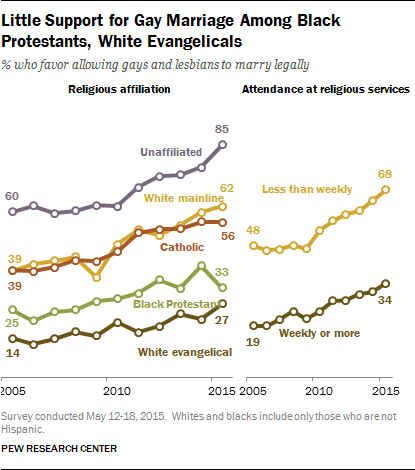
Fully 85% of those who are religiously unaffiliated favor same-sex marriage, up from 60% in 2005. Majorities of white mainline Protestants (62%) and Catholics (56%) support same-sex marriage; a decade ago just 39% of both groups supported it.
But just 33% of black Protestants and 27% of white evangelical Protestants favor same-sex marriage. Majorities of both groups (57% of black Protestants, 70% of white evangelicals) oppose gay marriage.
Opinion among black Protestants has changed relatively modestly over the past decade; in 2005, 25% favored gay marriage. And while support among white evangelical Protestants has increased 13 points (from 14% to 27%), white evangelicals oppose gay marriage by far greater than two-to-one.
Overall, 68% of adults who attend religious services less than once a week favor gay marriage, compared with 34% who attend weekly or more. In 2005, 48% of less frequent attenders of religious services backed gay marriage, as did 19% of those who attended more frequently.
Most Americans Say Legal Same-Sex Marriage is ‘Inevitable’
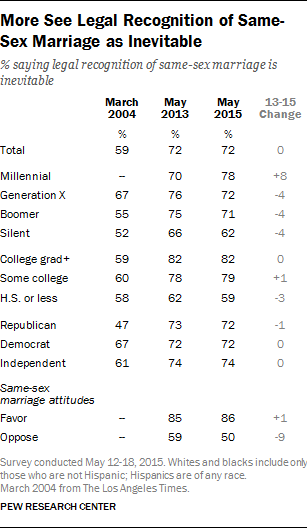
By a three-to-one margin (72%-24%), most Americans think that legal recognition of same-sex marriage is inevitable. While that is little changed from 2013, a greater share of the public expects gay marriage to be legally recognized today than did so in a 2004 survey by the L.A. Times (when 59% said this).
Across generations there is a broad sense that same-sex marriage eventually will be legally recognized, though older Americans are somewhat less likely to say this. Nearly eight-in-ten Millennials (78%), along with about seven-in-ten Gen Xers (72%) and Baby Boomers (71%), and 62% of those in the Silent generation say legal recognition is inevitable.
College graduates (82%) and those with some college experience (79%) are more likely than adults with a high school education or less (59%) to say legal recognition of same-sex marriage is inevitable.
As in 2013, similar percentages of Republicans (72%), Democrats (72%) and independents (74%) believe that legal same-sex marriage is inevitable. Republican views of same-sex marriage’s inevitable legal recognition are up 25 points since 2004 (from 47%). Democrats today are about as likely to say same-sex marriage is inevitable as they were 11 years ago (72% vs. 67%).
An overwhelming majority of same-sex marriage supporters (86%) say its legal recognition is inevitable, little changed from two years ago. Among opponents, just 50% say this; in 2013, opponents were nine points more likely to say same-sex marriage would eventually be recognized.
Importance of the Issue of Same-Sex Marriage

Just over half of the public says the issue of same-sex marriage is very (30%) or somewhat important (24%) to them. Two-in-ten (20%) say is not too important and 25% say it is not important to them at all.
Supporters and opponents of same-sex marriage are equally likely to see the issue as at least somewhat important (56% each), but opponents are more likely than supporters to say it is “very” important (38% vs. 27%).
However, those who feel strongly about the issue — on both sides — are particularly likely to say it is important. Among those who strongly favor gay marriage, 44% say it is a very important issue and just 11% say it is not important at all. And fully 53% of strong opponents say it is a very important issue to them.
Republicans (33%) and Democrats (31%) are about equally likely to say same-sex marriage is very important to them. And 40% of both conservative Republicans and liberal Democrats say it is a very important issue.
Millennials (34%) are more likely than those in older generations (29%) to see same-sex marriage as a very important issue. In addition, women (35%) are more likely than men (25%) to say it is very important.




